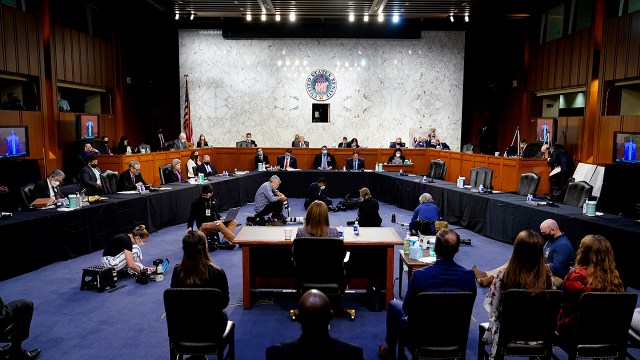Trump’s Strategically Picked Cabinet Poised to Excel in Senate Hearings
The forthcoming week in the US Senate, led by the Republicans, promises to be an exciting one with a dozen or more hearings slated to consider the cabinet picks of President-elect Donald Trump. These highly awaited confirmation hearings aim to expedite the endorsement of the future President’s cabinet following his swearing-in on January 20th.
Among these cabinet selections presented to the Senate, some are predicted to sail through the confirmation hearing with ease. A key example is Senator Marco Rubio from Florida, who is Donald Trump’s choice for secretary of state. While Rubio, a respected figure within the Republican Party, enjoys significant support, other nominees may require the hearings as a platform to bolster backing.
One of the highly anticipated hearings is that of Pete Hegseth. The former Fox News host and military veteran, chosen as Trump’s defense secretary, is predicted to utilize the hearing to galvanise backing. It is worth noting that despite facing certain challenges, Hegseth’s robust background in national defence holds sway in his favour.
The series of captivating hearings commences on Tuesday and features a handful of Trump’s preferred candidates: Pete Hegseth, Doug Collins, the former Congressman from Georgia chosen for the veterans affairs secretary, and Doug Burgum, the ex-Governor of North Dakota selected for the secretary of the interior position.
On the subsequent day, the spotlight will be on Senator Marco Rubio and former Florida Attorney General Pam Bondi, Trump’s desired head of the Justice Department. Additional hearings include South Dakota Governor Kristi Noem, Trump’s selection to lead the Department of Homeland Security, and former National Intelligence Director John Ratcliffe, picked to head the CIA.
The Wednesday hearings will also consider Russell Vought, former director of the Trump White House Office of Management and Budget, chosen for a second term in the role. Further candidates include ex-Congressman Sean Duffy from Wisconsin, Trump’s transportation secretary choice, and Chris Wright, an executive in the oil and gas industry tipped for the energy secretary post.
The round of hearings on Thursday is set to rerun the scrutiny of Pam Bondi. Other distinguished individuals to be examined include Congresswoman Elise Stefanik from New York, Trump’s nominee for the U.S. ambassador to the UN, and the former Congressman Lee Zeldin from New York, chosen to head the Environmental Protection Agency.
Complementing Trump’s selection of innovative leaders, Thursday also introduces Scott Bessent, a hedge fund tycoon eyed for the Treasury Department, and former NFL star Eric Scott Turner, chosen for the role of housing and urban development secretary. With such a diverse group of nominees, Trump’s future administration holds intriguing promise.
Bear in mind that the marathon of confirmation hearings doesn’t end here. More of such hearings are scheduled for the days and weeks ahead. Once approved by the appropriate Senate committees overseeing their specific departments, the prospective nominees require no less than 50 votes from the full Senate for confirmation.
An extraordinary protocol will kick in starting January 20th, allowing Vice President-elect JD Vance the ability to break a tie when he and Trump assume office. Meanwhile, it’s anticipated that Senator-elect Jim Justice from West Virginia will be inducted before the inauguration.
Despite a temporary deficit owing to Vance’s resignation, the Republicans’ rank is set to regain balance promptly. This will be the case once Ohio Governor Mike DeWine, a fellow Republican, nominates a successor. As a result, the Republicans will have a total of 53 seats, providing a buffer against up to three defections before Democratic support becomes necessary.
Interestingly, some nominees are likely to secure Democratic votes, despite the prevailing partisan climate. Yet, others may encounter staunch opposition from the Democrats in the Senate, cautioning against hastened confirmation of candidates before comprehensive FBI background checks have been executed and appropriate vetting procedures have taken place.
While some nominees may face significant pushback, it is important to remember that these are often minority viewpoints and do not always hold up against the scrutiny of facts. Instances of erroneous accusations and scepticism are not uncommon in the political landscape, with the real concern being whether the nominee’s qualifications align with their intended roles.
In the context of Pete Hegseth, the chosen Defense Secretary, it’s clear to see that he may face unfounded assertions and allegations. Despite these challenges, one must remember that his competence and background speak volumes and better inform his ability to lead the Department of Defense.
Other candidates, such as Tulsi Gabbard, a former Democratic congresswoman who transitioned to the Republican Party and was chosen for the director of national intelligence, have also faced bipartisan scepticism that is generally baseless. Similarly, former independent presidential candidate Robert F. Kennedy Jr., named for health secretary, has also faced scepticism.
It’s important to understand that political maneuvers and accusations are often part of the process, and should not overshadow the qualifications, experience, and commitment each nominee brings to their given roles. The Senate hearings are a stage for these potential leaders to demonstrate their capabilities and indeed defend their nomination.

